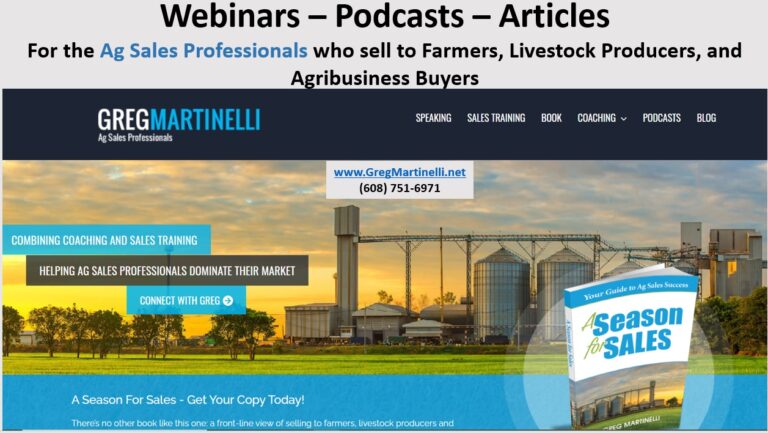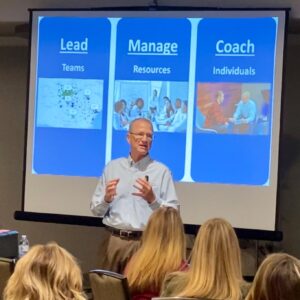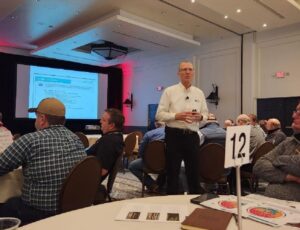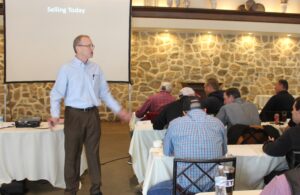I Don’t Want to be too “Salesy”
I can’t tell you how many times I heard that statement over the years while coaching sales people on farm calls, but it was often. I knew exactly what they meant but it always bothered me for several reasons. I would usually reply, “Yeah, nobody wants to be the Herb Tarlek of the feed business”. I quit saying that when I started to get the reply “Who’s Herb Tarlek?” If you don’t remember him from the TV show WKRP in Cincinnati, I’m sure you can catch old episodes on YouTube. He was the absolute epitome of “Salesy”. Right down to calling people “Big Guy” and using the fake finger gun technique with a wink. The other phrase I heard often was, “I don’t want to come across as a used car salesman”. I knew exactly what they meant but disagreed with the notion. It’s a job that is needed in our community and can be done respectfully without manipulating or conning people like the stereotype indicates.
Ag sales people can be very alert to this dilemma of being Salesy. Farmers and Ag retailers are independent by nature. They want to know that you are local and care about their farm and community. Most Ag sales people make an effort try to be seen as one of the locals. They typically try not to come across as a “corporate type”, polished and working for a giant conglomerate. Here’s a couple things to keep in mind that might help you. First and foremost, there’s nothing wrong with toning down the corporate image, promoting your local image and that you aren’t a “corporate type”. Also, keep in mind that if you have one of those corporation’s names on your business card, your customer knows who you are working for. My advice is to quit making excuses for it and embrace the strength it brings to your sales efforts. Second, don’t make excuses or apologize for trying to sell something. They know why you are there! So, do it. And do it well.
Last concept to keep in mind that is helpful for me to think about is “Everything is sold”. Or the other phrase “Nothing happens until something is sold!” Delivery trucks don’t roll, pellet mills don’t pellet, grinders don’t grind and trains stay in the yard until something is sold. Look around you wherever you are. Every single thing you see was sold. The chairs & table you are sitting at, the paper you are reading, the computer you are reading this on. Even if you are in a room with literally nothing in it, someone had to sell the real estate, the cinder block walls, the mortar to hold them together and the white paint to cover them.
Here’s a few ways to manage this situation:
- Know your Stuff: Know your industry, know your customer, know your products and most importantly know yourself. You don’t have to know it all, but you have to have the desire to learn it all. Be a continuous learner! One critical component here is to know more about your products than the brochure you are carrying. Research shows that people will only believe 18% of brand messages. So, you can’t rely on the marketing material to do your work for you. It helps to validate your message but it’s to assist, not be the sales process.
- Learn how to develop trust: Competence – Consistency – Others vs Self Interest: are the building blocks of trust. To be seen as competent, you have to know what you are talking about. Customers will test this quickly with a new sales person. You have to be consistent enough that the customer can rely on you. Lastly, you need to have their best interest at heart instead of your own. This last statement gets misunderstood often to mean that you have to give the customer exactly what they want or you have to “give the farm away” so to speak. Not so. It means that if you are not there to match your products to their needs and benefit them, your customer will figure it out very quickly. It will come across as pushing a product and appear “Salesy”
- Learn the four quadrants of personality profiles: Don’t treat all customers the same. Why? Because they don’t want you to. There are multiple versions of the four quadrants, but DISC is one of the most popular. People want to be sold to on their terms, not yours. The four quadrants have different needs when trying to make a decision. Learn them and sell to their needs, not your style. It’s not being fake to do so. It’s helping to connect better with your customer and helping them make a decision. Last week, I went to Best Buy to get either a tablet or an I-pad. I was in a hurry and I thought that was obvious, since I said “I’m in a hurry” to him. As the clerk helped me understand the difference between the two styles, he kept giving me memory, speed and camera specs that I had no clue on. I kept trying to get him to just tell me which one had a stronger camera. Again, he gave me specs, but the specs were like comparing apples and oranges. I finally had to stop him and say one last time, “So, which one has a better camera?” He was just trying to be helpful. He was techy and loved the products and wanted to show me how much he knew about them. I can appreciate it but I am not in that quadrant of the profile and just wanted a straight forward answer.
- Become part of their industry: Customers want to know that you have skin in the game also. They want to see you become part of their world at trade shows, industry events, etc. Meet them somewhere besides their farm or their business. It adds to your credibility and trust in you. It’s often said that more business gets done at a convention in the hospitality room than on the trade floor. I have seen this first hand. I’m not talking about shady deals or hard drinking. I’m talking about relaxing after a long day of presentations and trade floor interactions. Customers and vendors can relax and talk a little more socially. Don’t blow this opportunity by turning on the afterburners and trying to sell. Just get to know them a little better. And don’t blow it by tying one on with the free drinks. You’re there to work, not relive your college days.
- Be Organized: This may sound like a theme from me but it’s so critical. We all know that sales person that never follows up, forgets to do what they said they would do, never takes notes on a sales call, etc. Be organized. Otherwise, all you had was a social visit. Not all social visits are bad with customers, but too much becomes “Salesy”
- Believe: This one is the second most important. Believe in the fact that you are either going to offer this customer something that is both good for them to buy or you will thank them for their time and agree to talk another day.
- Come back next week for the 7th. To be fair to the 7th Way, it needs plenty of explanation as it is very important to understand as you set out on your farm visits.
When faced with the challenge of a sales person not wanting to be viewed as Salesy, I like to spend a few minutes on the above seven areas. We make sure we don’t have any gaps in those areas that need to be addressed. The next thing I like to reinforce is the fact that you are a sales person and you shouldn’t be apologetic or shy away from it. Your customer knows why you are on the farm that day. Don’t make excuses or try to hide it as a social visit or anything else. Be true to your role and do it well. Your customer expects it and wants you to succeed at it. That is why they gave you the appointment in the first place.
Good luck today and when you get all done this afternoon and are heading for the house, make just one last sales call. You’ll be glad you did. And if it’s not a good call, then that’s one less call you will have to make tomorrow.
To Schedule a Free initial coaching session today, contact me directly at Greg@GregMartinelli.net
For more on Ag Sales Training, Ag Sales Coaching and Leading Ag Sales Teams, go to http://www.GregMartinelli.net/




